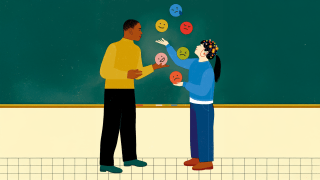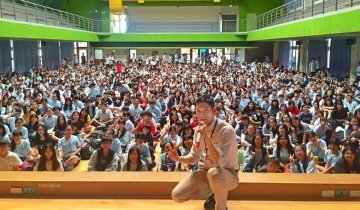What is educational psychology?
A field rooted in the science of teaching and learning
What do a study on how college students use artificial intelligence, a program that equips parents with coping strategies for when their children experience racism in schools, research on the roots of science denial and a study on ways to help students persist in STEM classes have in common? They are all research projects of USC Rossier’s educational psychology faculty.
Jessica DeCuir-Gunby, the Robert A. Naslund Chair in Curriculum and Teaching and executive director of the USC Race and Equity Center, defines the field of educational psychology as, broadly speaking, “the study of teaching and learning.” Educational psychology, DeCuir-Gunby says, “looks at the cognitive, developmental, social and emotional processes that impact teaching and learning.”
Associate Professor of Education Stephen Aguilar adds that ed psych also considers a crucial question: “Why do students want to learn?” The field not only looks at what motivates learners, but also at a range of phenomena that can impact their learning, including study habits, self-regulated learning strategies and how different processes affect learning, Aguilar says.
At USC Rossier, the field of educational psychology is well represented, with award-winning faculty leading research on some of the most timely and essential topics when it comes to the study of teaching and learning. Doctoral students can choose to focus on the field in their course of studies and take a range of courses that explore the field, from research methodologies to learning and motivation. And one of the unique aspects of the field is that the research findings touch and shape education in many ways, deeply informing how students across the school’s range of programs are prepared for the field.
The evolution of ed psych
The field of educational psychology has been around for some 150 years, says Gale Sinatra, Distinguished Professor and the Stephen H. Crocker Chair. Across the decades, there have been major shifts and evolutions in the field. Sinatra points to the cognitive revolution that began in the 1950s and continued through the 1960s as having a huge impact on the field. During this time, psychologists began to focus on unobservable processes that happen in the mind—including memory, attention, problem solving and reasoning, rather than behaviors that could be observed. This “changed the entire field’s perspective on learning,” says Sinatra.
In recent years, Sinatra cites the field’s changing perspective on emotion and cognition. “You think and learn with emotion,” Sinatra explains. Work like Mary Helen Immordino-Yang’s has shown that “thinking and learning are interrelated, if not one and the same,” Sinatra says. Immordino-Yang’s recent research, in fact, has proven, for the first time, that when adolescents engage in what she and her research team have coined as “transcendent thinking,” they can grow their brains and improve not only their learning outcomes but also their life satisfaction.
DeCuir-Gunby, who is also president of the American Psychological Association, Division 15, explains that the field has embraced more qualitative data and mixed methods approaches to research, something she studies and teaches at USC Rossier.
Professor of Education and Psychology Erika Patall, who studies motivation in learners, adds that over the last 20 years, research in the field has highlighted the “importance of the learning environment in supporting the educational process.” Strategies to create a positive environment for learners have been a priority, as have supporting students’ social and emotional needs. This has been a focus of Patall’s own work, as she’s looked at how student autonomy can improve engagement in STEM classes and investigated agentic engagement as a tool for improving student learning experiences.
Technology, AI and the future of education
The roles and impact of technology have also been top of mind for researchers in recent years. DeCuir-Gunby says educational psychologists are investigating the impact of artificial intelligence, considering how AI will impact learning and how we should use AI in learning contexts.
As co-director of the Center for Generative AI and Society, Aguilar has several research projects actively pursuing these types of questions around AI and education, including studies on how educators across the globe are using AI, how undergraduate students are navigating the world of AI and the creation of a platform that could provide real-time feedback to be, in effect, a “halfway decent peer editor,” powered by AI.
Dean’s Professor of Educational Equity and director of the Center for Empowered Learning and Development with Technology, Brendesha Tynes, also studies technology and has a number of projects focused on AI’s impact on academic and mental health outcomes.
She recently conducted a first-of-its-kind, daily diary study with adolescents as part of the Spencer Foundation-funded National Survey of Critical Digital Literacy. The study showed that students’ exposure to online algorithmic bias that they experience via search engines or social media platforms is associated with an increase in depressive and anxiety symptoms the following day.
Tynes and her research team are currently working to create a virtual platform that aims to improve students’ digital and media literacy while equipping them with mental health tools to counter the negative effects of cyberbullying. They’ve designed bleeding-edge mental health and time-travel experiences with character-driven, AI conversational agents. “When combined with the curriculum materials, young people will be able to practice their new digital literacy and coping skills in virtual reality,” Tynes says. Tynes’ goal is to completely transform the way schools prepare young people to navigate challenges both online and in traditional spaces.
Equity, race and culture in learning
In recent years, another huge evolution to impact the field is a focus on how culture and race affect the learning process. “We have been really silent on issues of race in our field,” says DeCuir-Gunby. While past research has considered race as a demographic variable, the analysis didn’t go far beyond that, she explains. “Now we are trying to look at the role of race as a construct and how it impacts the experiences of students,” DeCuir-Gunby says.
For example, for a current research project DeCuir-Gunby is working on with Provost Professor of Education, Business and Public Policy Shaun Harper, the two are gathering qualitative data from parents who have children who have experienced racism in schools to create a resource to equip parents with strategies to navigate fraught interactions with their children’s schools. The tool, DeCuir-Gunby says, will “help parents better understand what they are experiencing [so they can] better regulate the racism they are experiencing.” Wellness is at the center of the project as they aim to help parents keep themselves emotionally safe while taking care of their children.
Educational psychology meets policy
Another recent development in the field is the intersection of educational psychology with policy discussions. Historically, the field has not focused on systems and polices, but there is a “need to understand how policies are created and how they impact individuals,” DeCuir-Gunby says.
Sinatra is a leader in this burgeoning area. She sits on the editorial board of a new journal, Educational Psychology for Policy and Practice, and will have an article published in the publication’s inaugural issue, set for January 2026.
Sinatra points to educational psychology research on class size—particularly studies that found that smaller class sizes benefit learning—as an example of how ed psych research has informed policy. Unlike other educational fields, educational psychology, as a discipline, centers the learner and their experiences. “90% of education does not focus on the learner but the teacher, administrators, counselors, the curriculum… the learner is not always at the top of researchers’ concerns,” Sinatra says. Using research findings from the field to inform educational policy is not only necessary but essential, Sinatra says.
Sinatra’s work on climate change education is another example of how ed psych could inform education policy. Her research focuses on the general public’s understanding of climate change and those who are making decisions about education policy. Sinatra describes climate change as the “educational issue of our time.” She points to stats from UNICEF that count 241 million students who missed school due to climate-enhanced extreme weather events such as floods and fires.
The recent L.A. wildfires, where all LAUSD students missed two days of school and those in or close to evacuation zones missed far more or were moved to new schools because theirs burned down, drive this point home. Sinatra lost her home in the January Eaton fire, so she knows firsthand what it means to be displaced by a climate-related event.
Sinatra hopes that her work on climate change education will impact how our school systems prepare and respond to future challenges. Her recent book, Science Denial: Why It Happens and What to Do About It, focuses on the psychological factors contributing to the public’s growing doubt and resistance to things like climate change and vaccines.
Studying ed psych at USC Rossier
Students in USC Rossier’s doctoral programs can select educational psychology as an area of concentration, and the perspectives and research gleaned from the field permeate many of the school’s programs, from the Master of Arts in Teaching program to the Master of Education in Educational Counseling program.
For students interested in studying ed psych, DeCuir-Gunby emphasizes that the field is “inherently interdisciplinary. It is its own field of psychology, and one of those fields that pulls from different areas, " she explains. Students who aspire to study ed psych must be comfortable navigating these interdisciplinary spaces, she says. It's also important, DeCuir-Gunby says, for students to approach their work with the understanding that the research should inform what happens in the classroom, whether this be in a K–12 classroom or a university course.
Patall says one of the best things those interested in the field can do is, “Try it out! Seek out research experiences in ed psych to know if you are really interested. Find a scholar or professor studying the things you are interested in and pursue working with them on their research.”
And there are also a lot of opportunities beyond academia for those who graduate in the field, Patall says. There are jobs at education technology companies, research firms and school districts, to name just a few industries.
One of the most helpful things a potential ed psych student can do is gain some experience in education, Aguilar advises. And it doesn’t have to be teaching. “Learning is everywhere; when it’s formalized, it becomes education,” Aguilar says.










